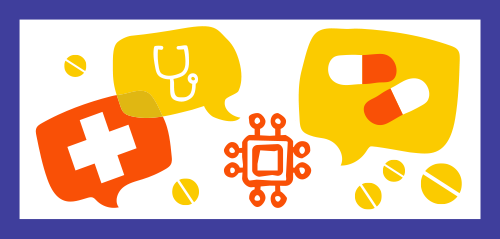ONE STAT THAT MATTERS
The healthcare industry is ready for AI. Are patients?
Healthcare organizations today are fully embracing AI, especially for patient care, as our one stat that matters shows. Patients, however, have been less sure about AI being involved in their care. Given this disconnect, the challenge for the industry now is as much about communication as it is about medicine.
According to McKinsey & Company, the industry’s turn toward AI isn’t just hypothetical. More than 7 in 10 healthcare organizations have either implemented AI already or are testing it out, with 73% of use cases delivering positive ROI. Among the promising applications2:
- Remotely monitoring vital signs (via wearable devices) to provide real-time insights, early detection and proactive interventions
- Bolstering medication adherence through AI reminders, personalized dosage instructions and monitoring of medication intake
- Assessing symptoms and offering personalized guidance for chronic disease management, triage, mental health and more
- Spotting patterns and abnormalities humans might miss, leading to early disease diagnosis and successful treatment strategies3
Addressing the skeptics
As excited as the industry is about AI, you see another side of the story if you take the pulse of prospective patients. 60% of people in the U.S. would be uncomfortable with their healthcare providers relying on AI.4 And only 38% believe it will improve patient outcomes.
As with any new technology not well understood by the public, education is essential to overcome uncertainty. First up, it’s important to show patients that AI will enhance a doctor’s care, not replace it.
When patients realize the benefits of AI – more detailed and accurate patient notes, real-time help with basic requests, content customized to their health profiles and preferences – they’re more likely to be receptive. Of course, more far-reaching AI capabilities may require more extensive communication efforts to get patients on board.
It goes without saying, organizations must be fully transparent about AI. Skeptical patients deserve to know when their care relies on it. Marketers can help healthcare organizations proactively inform and educate patients about the benefits (and limitations) of AI intervention as well as their commitment to ethical AI practices.
AI and health education
Educating patients on complex conditions, procedures or processes is another area where AI can make a strong impact.
Having created interactive education around health-related subjects such as Medicare, we’re thinking about ways AI can enhance those experiences through conversational give-and-take and integration with existing tools. Implemented properly, AI-based interactive modules, quizzes and adaptive learning experiences can provide a new level of utility to patients.
With initiatives like these, properly training AI on only relevant and approved content – and confirming the accuracy of its output – will be key. Misinformation or biases that skew results can undermine confidence and adversely affect people’s health.
Putting AI into practice(s)
While healthcare organizations have been quick to see the benefits of AI, it’s important that patients see those benefits, too. If you need help strengthening your communications and engagement efforts around AI, let’s talk ›
1 McKinsey, Generative AI in healthcare: Adoption trends and what’s next, July 2024
2 Light-it, Enhancing Patient Engagement with Generative AI in Healthcare, June 2023
3 WSI, A Digital Marketing Perspective on AI in Healthcare, October 2023
4 Pew Research Center, 60% of Americans Would Be Uncomfortable With Provider Relying on AI in Their Own Health Care, February 2023




 See what they have to say
See what they have to say